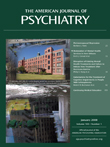Drs. Keitner, Solomon, and Ryan raise three important issues: 1) the limitations of current treatments in not producing sustained remission in a substantial number of depressed patients; 2) the undisputed importance of improving psychosocial function and quality of life for all depressed patients; and 3) the potential downside of medication combinations or other “complex treatment regimens.”
Since STAR*D did not evaluate all available treatments for depression, we cannot conclude that the 33% who did not reach remission after four treatment steps would not have benefited from other medications, psychotherapies, or somatic treatments. Furthermore, even at the fourth treatment step, a small but meaningful (8%–14%) number of participants achieved remission. Thus, the decision to scale back the goals of treatment to less than remission seems unwise until at least four treatment attempts. On the other hand, some patients may well be unable to reach and sustain remission. Clinicians must decide when to no longer pursue remission as the goal of treatment by making further treatment changes. However, patients who partially benefit from medication may further improve their well-being and quality of life when psychosocial interventions or other rehabilitative efforts are put in place (1, 2). On the other hand, given the undisputed advantage of remission, both functionally and prognostically continued efforts may well be worthwhile in selected patients. The decision to switch from remission to improved quality of life should be a collaborative one between patient and doctor. Indeed, efforts to improve function and quality of life, as noted by Dr. Keitner et al., can readily become part of the treatment regimen for all patients (remitted or not) and may be provided along with additional efforts to achieve remission.
Whether “more complex regimens” (i.e., medication combinations) are more burdensome, risky, or effective is an empirical question that deserves study. Many psychiatrists now use combination medications, but few controlled trials have actually evaluated this practice. Some studies (3, 4) do suggest better efficacy and little additional side-effect burden for selected combinations. Whole sale polypharmacy is not to be recommended. Carefully conducted randomized trials pitting monotherapy against drug combinations are needed to directly assess whether both acute and longer-term outcomes can be enhanced without undue patient burden.

